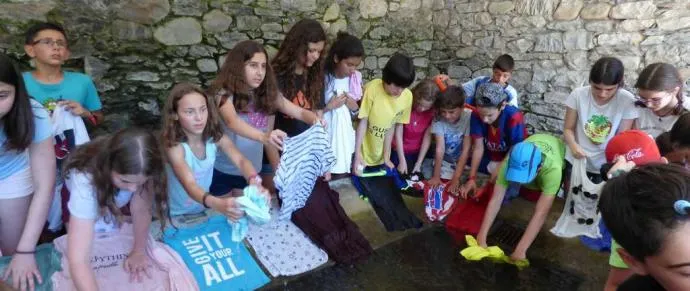Learning to control diabetes disease in a playful way is what 40 young diabetics arrived from all of Asturias and also from other parts of Spain are discovering during these days.They attend the summer camp organized by the Association of Diabetics of the Principality of Asturias (ASDIPAS), this year, for the first time in San Antolín de Ibias, where they occupy the facilities of the Hogar School of the Aurelio Menéndez School.
Five doctors and two nurses, in addition to medical and nursing students, and six monitors, all of them volunteers, are responsible for giving content to the camp, which dedicates a half hour to an informative session, in which theoretical knowledge andpractical on glucose control and hypoglycemia or insulin self -infection;The rest of the day is enshrined to recreational activities.All this marked by a strict control schedule of the disease in which the activity stops to do the relevant analyzes and put the insulin injections.
Isolina Riaño, a pediatrics specialist at the Children's Diabetes Unit of the Central University Hospital of Asturias (HUCA), considers that the camp is very important for attendees because "it helps them to be independent and capable of optimizing the control of the disease forthat does not pass them with the elderly. "In addition, it ensures that "it allows them to normalize and share experiences with other children of their own ages and make the disease do not involve an obstacle to develop as people."
For an old camp participant who currently attends as a nurse, his experience meant "absolute independence."Rosa Martínez points out that she learned "what I had to do and how I had to take care of me, which has meant that my development as a person has been normal."
Paula Pidal, current participant in the camp, explains that she is helping her to improve her control over the disease, food and the amount of insulin that should be put on.His partner Marta Martínez emphasizes that in the camp "the disease is seen in another way."One of the veteran is Andrea Hernández, of Tenerife, who after six years assisting confesses that he is already able to control the disease and adds: "I like to come because, in addition to learning about diabetes, we know people and do sports."
The afternoons in the municipal pool of Ibias, the excursions and the group games in the courtyard of the school make that for 10 days the participants gain a little of the heavy load that means dealing with the diabetes in their day to day.


